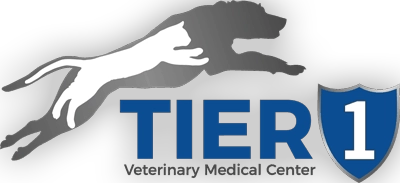The season of gratitude is here, and Tier 1 is so thankful for our patients, clients, and community. We want to share a few holiday precautions with you that will hopefully keep your pet out of the hospital for anything except coming to wish us happy holidays and receiving a critter-friendly Christmas cookie. Before you let your dog or cat sidle up to the table and help themselves, or sneak some scraps under the table, here are a few unsafe holiday foods for pets to avoid so that you aren’t facing an emergency vet bill that you may not be so thankful for.
Unsafe Holiday Foods for Pets
Turkey Bones
Bird bones will shatter and splinter and can pose a serious risk to the GI tract. Find someone else to split the wishbone with you.
Dark Meat
Dark meat and skin are both higher in fat than white meat. The dark meat from poultry and other rich, fatty meats, such as sausage, pepperoni, and bacon, can lead to stomach upset, gastritis, gastroenteritis, and pancreatitis, which can cause vomiting, diarrhea, lethargy, dehydration, and in severe cases death.
Chocolate
Most people know chocolate is a no-go for animals, but just to reiterate: it can cause vomiting and diarrhea in small doses, as well as severe heart arrhythmias and death in higher doses.
Mashed potatoes
It’s not the potatoes that are the problem; it’s everything else we all tend to doctor them with — butter, cheese, garlic, onions, sour cream, etc. And definitely no gravy. These mashed potato mix-ins can cause stomach upset and potentially life-threatening pancreatitis.
Onions & Garlic
Both onions and garlic can cause anemia (blood loss), which can lead to illness lasting weeks or longer and can be life-threatening. Take care where you leave the peelings.
Artificial Sweeteners
Especially for those of you trying to do low-calorie Thanksgiving treats, be very watchful for thieving paws. Artificial sweeteners such as xylitol cause seizures and liver failure, both of which can be fatal. These ingredients start acting very quickly and are very difficult to counteract in time.
Safe Holiday Foods for Pets
If you must share the thanks, and let’s be honest, plenty of us do, here are pet-safe treats that are okay to “fall off the table.”
White Meat Turkey
Ideally, not basted, brined, or deep-fried, but baked white meat turkey is safe. If you must share a little of the thankful spirit, try a small piece of turkey breast for your pets.
Pumpkin/sweet potatoes
Cooked and free of a lot of butter, cream, and other additives, these are a tasty — although bland — and high fiber treat that is safe for our furry Thanksgivers.
Green Beans
That’s green beans, not green bean casserole! Most dogs and some cats like green beans, especially frozen; they are a tasty, chewy treat. Be cautious of feeding your pets too many canned green beans, as they can be high in sodium.
My animals are always part of the holiday celebrations. However, I add a pet-safe turkey treat or chew to my shopping list and try to resist the urge to share from the table. We don’t like to leave out family members, but sometimes being a responsible owner and pet-parent means knowing what’s good for them and loving them enough to say no.
If your animal does schnarf something they shouldn’t, know that Tier 1 and other urgent and emergency hospitals are open late and staffed all Thanksgiving day for your emergency care needs. Give us a call or bring your animal in if an emergency arises.
Tier 1 Veterinary Medical Center in Palmer is Alaska’s only comprehensive animal hospital. We are available by appointment, in addition to accepting emergencies and walk-ins. With CT, MRI, and Ultrasound available on-site, our facility provides advanced treatment options for your pet. Contact us today to schedule an appointment.
